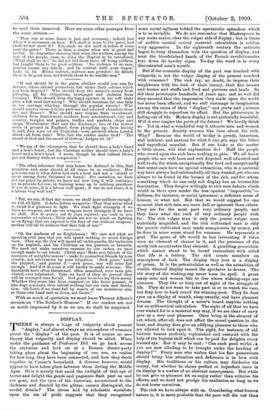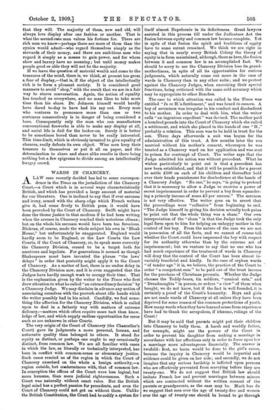DISPLAY.
mllERE is always a Cage of vulgarity about present
"display," and almost always an atmosphere of romance about the " display " of the past. It is of course no new theory that vulgarity and display should be allied. When under the guidance of Professor Dill we go back across the centuries and look on at a Roman dinner-party taking place about the beginning of our era, we realise for how long they have been connected, and how they dwelt together in Caesar's household. A divorce, however, would appear to have taken place between them during the Middle Ages. Or is it merely that amid the twilight of that age of terror and delight the gands and pageants Bash past us and are gone, and the eyes of the historian, accustomed to the darkness and dazzled by the glitter, cannot distinguish the sordid details P The stress laid by scholastic moralists upon the sin of pride suggests that they recognised some social ugliness behind the spectacular splendour which is to us invisible. We do not remember that Shakespeare in any scene makes clear the vulgar side of display; but in times of sudden mental revival material ostentation is seldom very aggressive. In the eighteenth century the satirists began to busy themselves with the question of display, and soon the bloodstained hands of the French revolutionaries tore down its tawdry signs. To-day the word is in every discontented man's month.
But if the romantic display of the past was touched with vulgarity, is not the vulgar display of the present touched with romance ? The rich try, no doubt, to impress their neighbours with the look of their luxury, their fine houses and horses and stuffs and food and pictures and lands. So did their prototypes hundreds of years ago; and so well did they succeed that the impression they made upon the world has never been effaced, and we still rummage in imagination among the ruins of their "display," and poets and y ainters still struggle to reproduce its effect. But the picturesque is fading out of life. Modern display is not pictorially beautiful. Will it ever inspire the poets of the future We hardly think so. Yet in what a wonderful way it attracts men and women in the present. Society swarms like bees about the rich. Why P Because the world of to-day is greedy, luxurious, and indolent, and anxious for what it can get, says the bitter and superficial moralist. But if one looks at the matter a little closer, will that explanation do? Half the people who crowd upon the rich have nothing to gain. We all know people who are well born and well disposed, well educated and well-to-do, for whom exceptionally fine food and exceptionally fast motor-cars have no special attractions, who in a material way have always had substantially all they wanted, yet who are always to be found in the houses of the rich, and for whom something which we can only call display has an irresistible fascination. They forgive willingly to rich men defects which would in their eyes render the leas opulent " impossible,"— dullness, for instance, or social ignorance, a deficient sense of honour, or what not. Not that we would suggest for one moment that rich men are more dull or ignorant than others They are for the most part very ordinary people, and they have what the ruck of very ordinary people wish for. The rich vulgar man is only the poorer vulgar man materially magnified, and the rich cultivated man is only the poorer cultivated man made conspicuous by money, yet he does in some sense stand for romance. He represents a goal. The game of life would be less interesting if there were no element of chance in it, and the presence of the newly rich accentuates that element. A gambling generation which cannot stand to be bored remembers with relief that life is a lottery. The rich create somehow an atmosphere of luck. The display they love is a display of prizes. It is the potentialities as well as the actualities of wealth whereof display causes the spectator to dream. The old story of the wishing-cap never loses its spell. A great many men and women like to live where wishing-caps are common. They like to keep out of sight of the struggle of life. They do not want to take part in or to watch the race, but they love to bask round the winning-post. They fix their eyes on a display of wealth, sleep sweetly, and have pleasant dreams. The thought of a miser's board inspires nothing but an arithmetical calculation. The sight of all that we have ever wished for in a material way may, if we are clear of envy give us a very real pleasure. Once bring in the element of art, which, after all, does not affect the moral question in the least, and display does give an edifying pleasure to those who are allowed to look upon it. The sight, for instance, of old historic houses perfectly replenished and restored with the help of the highest skill which can be paid for delights every trained eye. But it may be said: " Can such good works : you are now alluding to be brought under the heading of display P" Every man who wishes that his fine possessions should bring him attention and deference is in love with display. His traditions or his culture may deodorise his money, but whether he shows perfect or imperfect taste in its display is a matter of no abstract consequence. But while he can give us pleasure let us enjoy rather than criticise his efforts, and we need not grudge his exaltation so long as we do not lower ourselves.
The rich we have always with us. Considering what human nature is, it is more probable that the poor will die out than
that they will. The majority of them, new and old, will always love display after one fashion or another. That is -what the second-rate man values his fortune for. There are rich men we know—perhaps there are more of them than the cynics would admit—who regard themselves simply as the stewards of their money, and there are ambitious men who regard it simply as a. means to gain power, and for whom show and luxury have no meaning ; but until money makes people good or able they will not be the majority.
If we leave the question of material wealth and come to the treasures of the mind, there is, we think, at present too great a fear of display,—that is, if the object of the intellectually rich is to form a pleasant society. It is considered good manners to avoid "shop," with the result that we are in a fair way to starve conversation. Again, the notion of equality has touched us everywhere, and no man likes to take more time than his share. Dr. Johnson himself would hardly have dared to-day to have had his say out. Every man who ventures to pronounce more than one or two sentences consecutively is in danger of being considered a bore. Consequently only the man who can manufacture conversational fireworks is able to make any display at all, and social life is dull for the looker-on. Surely it is better to be sometimes bored than never to be really interested. This time-limit, which is obviously invented to give equality of chances, really defeats its own object. Wise men keep their treasure to themselves or put it all on paper, and the determination to share and share alike results in there being nothing but a few epigrams to divide among an intellectually hungry crowd.



























































 Previous page
Previous page